Les Miserables is Great Literature, (or 'the Phantom of the Opera,' This Ain't).
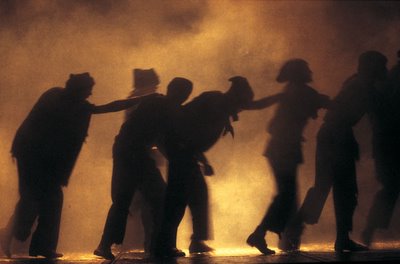 Surfing the net with the kids, we stumbled across a bit of news. After twenty years on stages in London, Paris, Tokyo, New York, New Orleans--and touring companies throughout the nations, Cameron Macintosh has decided to take the musical production to the movies. That's great news. I'm sure I'll disagree with various casting, editing, and staging decisions. But right now the kids are watching the video of the "concert" which is costumed but generally unstaged. They are so fascinated. I'd love to be able to show them a movie.
Surfing the net with the kids, we stumbled across a bit of news. After twenty years on stages in London, Paris, Tokyo, New York, New Orleans--and touring companies throughout the nations, Cameron Macintosh has decided to take the musical production to the movies. That's great news. I'm sure I'll disagree with various casting, editing, and staging decisions. But right now the kids are watching the video of the "concert" which is costumed but generally unstaged. They are so fascinated. I'd love to be able to show them a movie.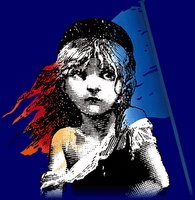
What I haven't written about is how much I love this book. It is my favorite novel--and I love quite a few. But this one stands alone. Not for its poetry, nor its concise prose (I'm not a big fan of the 50-page essays on the battle of Waterloo, for example, or the fact that you meet the main character on page 60.) But if you are patient and take the book for what it is, remembering the French Romantic context, the saga will get into your blood.
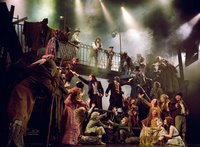
 I can explain what I like about Victor Hugo's master- piece in simple terms. It's the plot: Great heroes, great villains, and an amazing story of redemption. Les Miserables is a parable: the amazing story of powerful figures who give all that they have to rescue wretched lives who can give them nothing in return.
I can explain what I like about Victor Hugo's master- piece in simple terms. It's the plot: Great heroes, great villains, and an amazing story of redemption. Les Miserables is a parable: the amazing story of powerful figures who give all that they have to rescue wretched lives who can give them nothing in return. Consider:
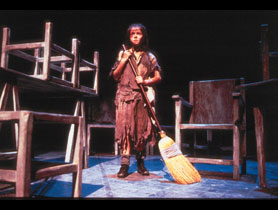 1. Jean Valjean's misery begins when he is imprisoned for 19 years after stealing a loaf of bread to feed his sister's starving children.
1. Jean Valjean's misery begins when he is imprisoned for 19 years after stealing a loaf of bread to feed his sister's starving children.2. When Valjean is released a hardened criminal, he robs the first person to give him a room for the night, a priest. The next day he is caught with the priest's table silver, but the priest insists it was a gift--and complains that Valjean "forgot" the priest's huge silver candlesticks and shoves them into the man's bag (more than a few of the first 100 pages are spent explaining how generous the priest is, keeping to himself only two prized possessions--his candlesticks). After the gendarmes leave, the priest insists: "I have bought your soul for God." Soon Valjean meets Christ.
3. Eight years later, Valjean is a rich inventor-mayor, successful and living under an assumed name, when in plain view of a police inspector he knows from days in prison, Valjean lifts a huge cart off a man who has been crushed by its weight. In doing so, he risks not only extraordinary physical injury, but also "blowing his cover" by allowing the inspector to discover the mayor's unmatched physical strength. Indeed the inspector confronts the mayor, insisting no one he has ever known could do what the mayor did--except an unnaturally-strong fugitive who long ago broke parole and disappeared.
4. When the inspector explains to the mayor that he has finally found the missing Valjean and the man will be returned to prison in a matter of days, the real Valjean--after much soul-searching--reveals his true identity as ex-con 24601, thus giving up his wealth and position to prevent the imprisonment of a man he is sure is probably a no-account criminal anyway.
5. Valjean, now on the run, slows down long enough to rescue Cosette, the suffering child of Fantine--formerly a worker in Valjean's factory. Valjean will spend the next eight years raising her as his own, an anchor that frequently brings him close to being re-arrested.
6. Valjean stumbles across student-rebels who have located a spy, Valjean's old nemesis, the inspector Javert. Valjean convinces the students to release Javert into his hands, and he subsequently releases Javert, proving his own integrity once again, much to the distress of Javert.
7. When Cosette falls in love for a student in Paris named Marius, Valjean is filled with an irrational hatred. Cosette has become all that Valjean loves in the world, and he can't imagine sharing her with anyone. Nevertheless, when Marius is injured at the barricades, Valjean--a man of extraordinary physical strength--takes Marius on his back and climbs with him into the famous Paris underground. Thus carrying his 'enemy,' Valjean travels miles across the city in the dark, wet underground. At one point, he is followed by someone he thinks is the police inspector, Javert. But Valjean presses on through water so deep his lips are submerged and he can breathe only through his nose. Finally, he comes out on the other side of town, by now praying for the life of Marius.
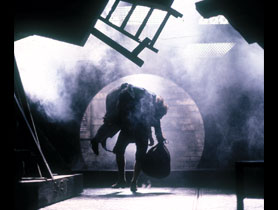
God gives all He has to rescue those who can give Him nothing in return. Les Miserables is an extended metaphor: a parable of redemption.


6 Comments:
Thank you--you won't regret it.. But be prepared for a "patient" pace....
By S., at 8:32 AM, January 17, 2006
S., at 8:32 AM, January 17, 2006
Having received a copy of the unabridged version from my brother (you know who you are), I decided that I would read it all. Throught the year I took reading it, I never regreted a chapter. I only missed it when I was finished...
By The Doctor, at 11:39 PM, January 18, 2006
The Doctor, at 11:39 PM, January 18, 2006
nice brain CT, btw.
you should get a copy of yours though. that would be cool.
By The Doctor, at 11:40 PM, January 18, 2006
The Doctor, at 11:40 PM, January 18, 2006
Now where would a hapless laymen like me get something like that? (Where do you think I got this one?)
By S., at 10:14 PM, January 19, 2006
S., at 10:14 PM, January 19, 2006
call dr. Weil or the memorial radiology dept.
By The Doctor, at 1:44 PM, January 23, 2006
The Doctor, at 1:44 PM, January 23, 2006
What I'm trying to say is look more closely at the film. It has my name on it....
By S., at 2:57 PM, January 23, 2006
S., at 2:57 PM, January 23, 2006
Post a Comment
<< Home